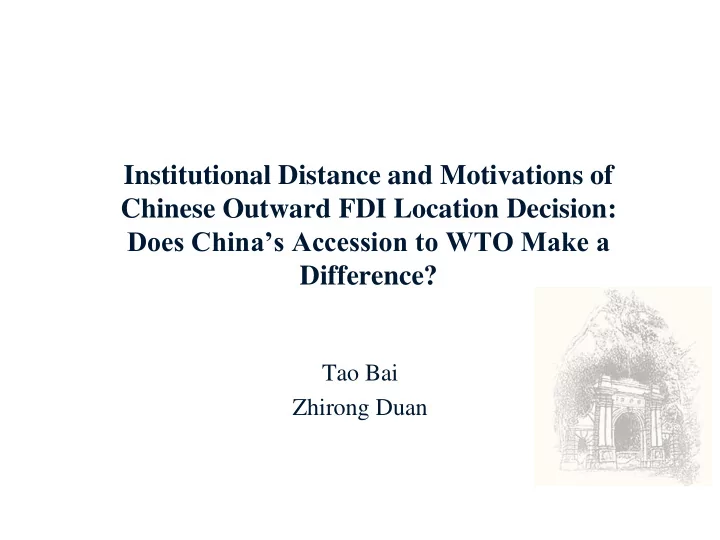

Institutional Distance and Motivations of Chinese Outward FDI Location Decision: Does China’s Accession to WTO Make a Difference? Tao Bai Zhirong Duan
Research Background Despite the rich literature on the location choice of firms when going international, few previous studies get a holistic view of both macro-level (i.e., institutional environment) and firm-level antecedents. The Myths • Would institutional distance have a positive impact on the location’s likelihood of being chosen? • Internal motivations and external environment, how they jointly affect firms’ location choice? • Would big institutional events such as the accession to WTO change the dynamics between internal, external predictors and location decisions?
Institutional Distance Legitimacy Firms need to achieve legitimacy in different institutions through building social identity conforming to external and internal institutional pressures (Chan et al., 2006; Chan & Makino, 2007). Political and institutional hazards There is a tendency for firms to avoid or minimize the exposure in institutional hazards (Feinberg & Gupta, 2009). Liabilities of foreignness from the lack of legitimacy disadvantages Political and institutional hazards on survival
Institutional Distance: the Other Side From disadvantages to advantages (1) Compared to their developed market counterparts, firms from emerging markets were trained in imperfect market environments; (3) Lack of property protection reminds firms to take extra precautions; (4) Corruption could provide an opportunity to gain legitimacy; (5) Political instability could provide new opportunities in the transition process.
Strategic Motivations Efficiency-seeking, resource-seeking, market-seeking and strategic asset-seeking (Dunning 1977, 1993). MNEs from China investing overseas to explore and exploit ownership advantages (Luo & Tung, 2007); Most extant literature focuses on the motive to obtain strategic assets, overlook the fact Chinese firms own specific advantages and trying to exploit worldwide (Buckley et al., 2007; Liang et al., 2012). Technology vs. market
The WTO Effect FDI location factors became more influential in the time of institutional change. • E.g., Portugal’s net FDI pattern been influenced by accession to EEC, EU and the fall of Berlin wall (Buckley & Castro, 1998). Why China’s accession to WTO Might Matter: • Conformation to WTO requirements; • More industrial sectors opened up to foreign investors; • China’s domestic competition became more fierce; • After the event, firms (in particular large SOEs) paid more attention on competence-building and were more adaptive in strategy.
WTO Effect: Role of Motives? The opening of once protected industries and markets to foreign and domestic competitors heightened Chinese domestic competitive pressures (Buckley et al., 2007), encouraged more firms investing abroad. China’s WTO membership accelerated the pace of Chinese firms’ internationalization to improve their own competitive advantages through accessing and learning new technology and know-how (Buckley et al., 2007). Certain institutional factors such as political instability could be less likely to be influenced by the country’s WTO membership (Delios & Henisz, 2003).
Data Screening Criteria • We excluded projects initiated before 1996 since only 74 ODI projects from 1978 to 1995 were recorded. The booming number of FDI projects after 1995 could be a result of the Chinese government’s policy of ‘going global’ inn 1996. • Annual sale of at least RMB 30 million at the end of the year • Officially registered at least 5 years • Excluded travel agencies and intermediaries that acted purely as a broker • Excluded investments that exited the survey for reasons other than failure The final sample consists of 489 outward investment projects conducted by Chinese firms during the period from January 1996 to December 2004. 39 host countries were involved. All information of our sample projects came from the Ministry of Commerce
Variables Dependent variables • Motivation-specific indicators. Destinations of investment projects are graded according to their level of market growth potential and technology advancement (Galan et al., 2007). We use dummies to represent our two dependent variables: market-seeking and technology-seeking. Independent variables • Political instability, property right protection, government corruption, each of these 3 indexes were coded from 1 to 7, compared with the situation in China (officially coded as 2). Control variables • Ownership: a dummy variable (coded 1 if the MNE is state-owned and 0 otherwise). FDI inflow; International experience; Time of investment •
Analytical Method A preliminary examination of the distributions of the distance measures was conducted before testing the effects identified in the hypotheses. It was found that the measures were highly skewed to the left. Logistic regression models are chosen, since it is one of the most robust tests when the independent variables are not normally distributed (Hair Jr. et al. 2006). This approach also helps to reduce the effects of common method bias (Podsakoff et al. 2003). The three measures are strongly correlated with each other. Following Galan et al. (2007), to avoid interpretation problem derived from collinearity, four different models are estimated for each of the two motives
Results All three measures of institutional distance are positively associated with both market-seeking and asset-seeking. Effects of all three institutional factors are stronger in their connection with the potential of market growth than with technology advancement. Corruption has a much stronger association with the growth potential of market that the other two Property protection seems to be the most relevant institutional factor among the three to technology-seeking investment decisions.
Results (cont.) The influence of property protection on market-seeking decisions drops largely after China’s entry of WTO The association between political instability and the market-seeking investment become even stronger Property protection has been a consistent influencing factor to the investments through the lens of comparative technology advancement Positions of political instability and corruption on influencing technology related investment decisions have switched before and after WTO, in particular, corruption’s influence changed from significantly positive before WTO to not significant afterwards.
Recommend
More recommend